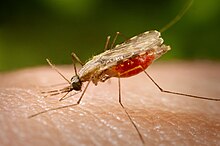
Back التكاثر غير التلقائي Arabic Anautogenia Spanish Anautogenia Italian Анавтогенез Ukrainian 非自發性生殖 Chinese

In entomology, anautogeny is a reproductive strategy in which an adult female insect must eat a particular sort of meal (generally vertebrate blood) before laying eggs in order for her eggs to mature.[1] This behavior is most common among dipteran insects, such as mosquitoes.[2] Anautogenous animals often serve as vectors for infectious disease in their hosts because of their contact with hosts' blood. The opposite trait (needing no special food as an adult to successfully reproduce) is known as autogeny.[3]
- ^ "Anautogenous". Merriam-Webster Medical Dictionary. Retrieved 25 June 2016.
- ^ "Dipteran". Encyclopædia Britannica. Retrieved 25 June 2016.
- ^ Engelmann, Franz (2015). The Physiology of Insect Reproduction (revised ed.). Elsevier. pp. 124–7. ISBN 9781483186535. Retrieved 25 June 2016.